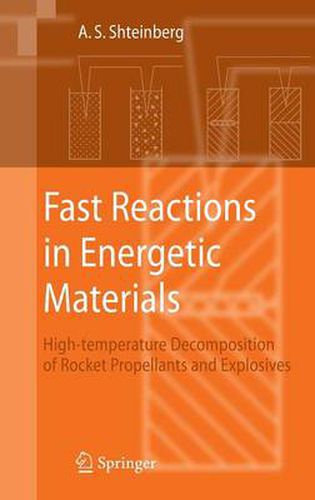Readings Newsletter
Become a Readings Member to make your shopping experience even easier.
Sign in or sign up for free!
You’re not far away from qualifying for FREE standard shipping within Australia
You’ve qualified for FREE standard shipping within Australia
The cart is loading…






This title is printed to order. This book may have been self-published. If so, we cannot guarantee the quality of the content. In the main most books will have gone through the editing process however some may not. We therefore suggest that you be aware of this before ordering this book. If in doubt check either the author or publisher’s details as we are unable to accept any returns unless they are faulty. Please contact us if you have any questions.
Modern energetic materials include explosives, blasting powders, pyrotechnic m- tures and rocket propellants [1, 2]. The study of high-temperature decomposition of condensed phases of propellants and their components (liquid, solid and hybrid) is currently of special importance for the development of space-system engineering [3, 4]. To better understand the burning mechanisms (stationary, nonstationary, - steady) of composite solid propellants and their components, information about the macrokinetics of their high-temperature decomposition is required [5]. To be able to evaluate the ignition parameters and conditions of safe handling of heat-affected explosives, one needs to know the kinetic constants of their high-temperature - composition. The development of new composite solid propellants characterized by high performance characteristics (high burning rates, high thermal stability, stability to intrachamber perturbations, and other aspects) is not possible without quanti- tive data on the high-temperature decomposition of composite solid propellants and their components [6]. The same reasons have resulted in signi?cant theoretical and practical interest in the high-temperature decomposition of components of hybrid propellants. It is known that hybrid propellants have not been used very widely due to the low bu- ing (pyrolysis) rates of the polymer blocks in the combustion chambers of hybrid rocket engines. To increase the burning rates it is necessary to obtain information about their relationships to the corresponding kinetic and thermophysical prop- ties of the fuels.
$9.00 standard shipping within Australia
FREE standard shipping within Australia for orders over $100.00
Express & International shipping calculated at checkout
This title is printed to order. This book may have been self-published. If so, we cannot guarantee the quality of the content. In the main most books will have gone through the editing process however some may not. We therefore suggest that you be aware of this before ordering this book. If in doubt check either the author or publisher’s details as we are unable to accept any returns unless they are faulty. Please contact us if you have any questions.
Modern energetic materials include explosives, blasting powders, pyrotechnic m- tures and rocket propellants [1, 2]. The study of high-temperature decomposition of condensed phases of propellants and their components (liquid, solid and hybrid) is currently of special importance for the development of space-system engineering [3, 4]. To better understand the burning mechanisms (stationary, nonstationary, - steady) of composite solid propellants and their components, information about the macrokinetics of their high-temperature decomposition is required [5]. To be able to evaluate the ignition parameters and conditions of safe handling of heat-affected explosives, one needs to know the kinetic constants of their high-temperature - composition. The development of new composite solid propellants characterized by high performance characteristics (high burning rates, high thermal stability, stability to intrachamber perturbations, and other aspects) is not possible without quanti- tive data on the high-temperature decomposition of composite solid propellants and their components [6]. The same reasons have resulted in signi?cant theoretical and practical interest in the high-temperature decomposition of components of hybrid propellants. It is known that hybrid propellants have not been used very widely due to the low bu- ing (pyrolysis) rates of the polymer blocks in the combustion chambers of hybrid rocket engines. To increase the burning rates it is necessary to obtain information about their relationships to the corresponding kinetic and thermophysical prop- ties of the fuels.